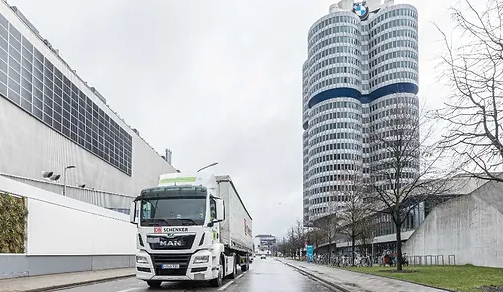
Photo: BMW Group
The future is already on the Autobahn: Between the BMW plant in Munich, Germany, and Landau an der Isar, about 120 kilometers (km) to the northeast, four trucks can be seen coming and going several times a day.
They are operated by the logistics provider Guggemos (GV Trucknet), their green stickers proclaiming their eco-credentials: “Ich tanke HVO100, um CO2 -Emissionen zu senken” (“I tank with HVO100 to save CO2 emissions”).
Delivering supplies just in time from Landau to the home plant in Munich, the trucks have been running on renewable HVO100 diesel since December.
It’s all part of a one-year pilot program to trial the new fuel.
In March, the HVO100 test fleet was expanded to include another six trucks, this time belonging to DB Schenker.
They commute between the BMW Group Supply Center in Eching, just north of Munich, to deliver warehouse parts to the plant in the city for production—a round trip of 40 km each time.
“HVO” stands for hydrotreated vegetable oil, another term for renewable diesel fuel, and the “100” in the name of the fuel confirms that conventional diesel vehicles can tank 100 percent with the pure renewable fuel.
HVO100 is made from various waste products, residues and renewable raw materials, including used cooking oil.
Compared with fossil diesel, it produces up to 90 percent less CO2 well-to-wheel.
On average, fuel consumption is about 3 percent higher with HVO100, but the 10 trucks currently piloting the fuel—also known as Neste MY Renewable Diesel™, made by Finland’s Neste Corp.—for the BMW Group are expected to emit up to 800 metric tons less CO2 a year than they would with conventional diesel.
The progressive HVO100 pilot project is the next step in the consistent implementation of the BMW Group’s Green Transport Logistics Strategy—an integral part of the BMW iFactory.
Michael Nikolaides, head of BMW Group’s production network and logistics, is convinced that “every gram of CO2 we can save helps.”
An advocate of keeping an open mind to all technologies, he added, “We continue to reduce the carbon footprint from our transport and supply chains through a variety of measures.”
The BMW Group already uses electric and gas-powered trucks at various sites, and at the Hydrogen Competence Center in Leipzig, floor conveyors are fueled with hydrogen for everyday operations.
Electric trucks are already operating at BMW Group Plant Munich.
“The use of HVO100 in logistics brings another sustainable technology to BMW Group Plant Munich,” said Peter Weber, director of BMW Group Plant Munich. “It plays a valuable part in helping the company achieve its sustainability goals and represents a further component in the plant’s transformation to a BMW iFactory with a lean, green, digital approach.”
Nikolaides sees some major advantages in the simple use of HVO100—vehicles and engines require no modifications to run on the ecofriendly fuel, and HVO can be used pure or mixed with fossil fuel in any ratio.
It can also be supplied via the existing fuel-station infrastructure.
The BMW Group’s partner on the current HVO100 pilot project is the Finnish company Neste, whose hydrotreated vegetable oil is based on its patented NEXBTL technology and produced purely from renewable raw materials, with plant oils being converted to hydrocarbons through a catalytic reaction with hydrogen.
HVO diesel is not the same as biodiesel, however, which is chemically different and produced by a different process.
By using the new fuel in transport logistics, the BMW Group intends to find out how renewable diesel works in everyday operations and how cost-efficient it is.
“We want to know which drive technologies and fuels work best in which contexts,” Nikolaides explained.
To do this, a team of BMW Group experts is evaluating aspects such as fuel consumption with different loads, at different speeds, in a variety of weather conditions, and over shorter and longer distances.